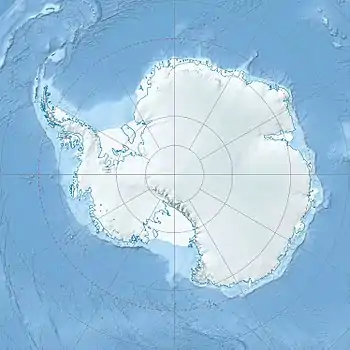Apfel Glacier
Apfel Glacier (66°25′S 100°35′E) is a glacier about 5 nautical miles (10 km) wide and 20 nautical miles (40 km) long, flowing west-northwest along the south flank of the Bunger Hills and terminating in Edisto Ice Tongue. It was mapped from air photos taken by U.S. Navy Operation Highjump, 1946–47, and named by the Advisory Committee on Antarctic Names for Earl T. Apfel, professor of geology at Syracuse University, who served as geologist with the U.S. Navy Operation Windmill parties, 1947–48, which established astronomical control stations along Queen Mary, Knox and Budd Coasts.[1]
| Apfel Glacier | |
|---|---|
 Location of Apfel Glacier in Antarctica | |
| Location | Queen Mary Land |
| Coordinates | 66°25′S 100°35′E |
| Length | 5 nmi (9 km; 6 mi) |
| Thickness | unknown |
| Terminus | Edisto Ice Tongue |
| Status | unknown |
References
- "Apfel Glacier". Geographic Names Information System. United States Geological Survey. Retrieved 2011-05-11.
![]() This article incorporates public domain material from the United States Geological Survey document: "Apfel Glacier". (content from the Geographic Names Information System)
This article incorporates public domain material from the United States Geological Survey document: "Apfel Glacier". (content from the Geographic Names Information System)
| Types | |||||||
|---|---|---|---|---|---|---|---|
| Anatomy | |||||||
| Processes | |||||||
| Measurements | |||||||
| Volcanic relations | |||||||
| Landforms |
| ||||||
| |||||||
Glaciers of Queen Mary Land | |
|---|---|